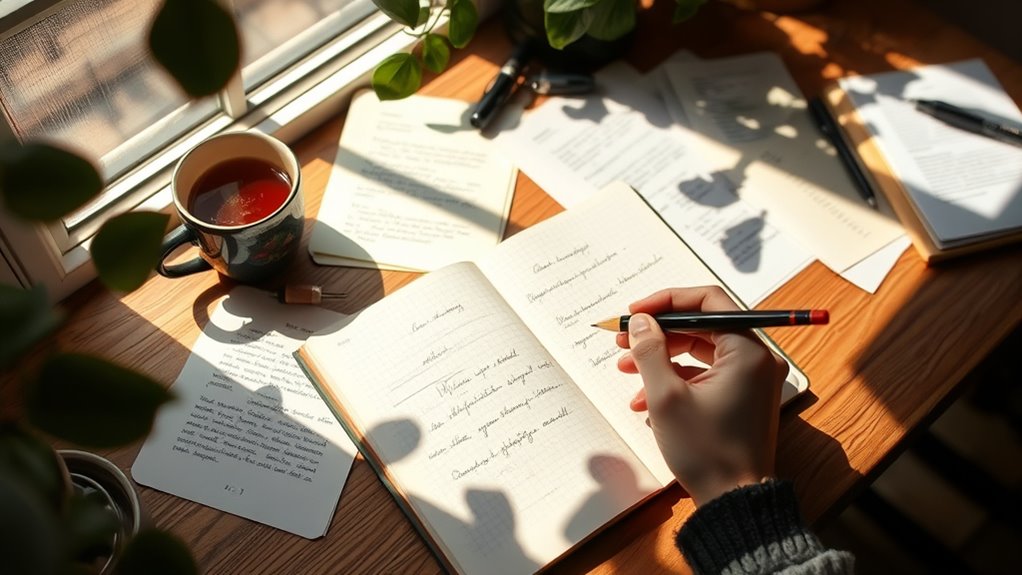Journaling plays a key role in self-discovery by helping you explore your thoughts, emotions, and experiences with clarity. It encourages emotional awareness, reveals patterns, triggers, and core beliefs, and fosters mindfulness practices. By regularly reflecting on your feelings, you develop better self-understanding and healthier coping strategies. Over time, journaling builds a stronger, more compassionate relationship with yourself. To unveil more about how journaling can open your inner world, continue exploring these transformative benefits.
Key Takeaways
- Journaling enables exploration of thoughts, emotions, and experiences, fostering greater self-awareness and understanding.
- It helps identify emotional patterns and triggers, revealing hidden feelings and beliefs influencing behavior.
- Incorporating mindfulness into journaling enhances present-moment awareness and emotional clarity.
- Regular journaling supports emotional processing, reducing suppression and promoting self-compassion.
- Reflecting through writing facilitates personal growth by recognizing insights and developing healthier coping strategies.

Journaling is a powerful tool for self-discovery, allowing you to explore your thoughts, emotions, and experiences with clarity. When you put pen to paper, you create a space to recognize and understand your emotional awareness. This process helps you identify patterns, triggers, and feelings that might otherwise stay hidden beneath the surface. As you journal regularly, you develop a heightened mindfulness practice, learning to observe your inner world without judgment. This mindful approach encourages you to stay present with your emotions, whether they’re positive or challenging, and fosters a deeper connection with yourself.
Journaling fosters self-awareness by helping you recognize emotions and patterns with clarity.
By engaging in consistent journaling, you begin to notice how your emotions fluctuate throughout the day. For example, writing about moments when you feel stressed or overwhelmed can reveal underlying causes, such as unresolved conflicts or unmet needs. Recognizing these emotional patterns is essential for emotional awareness, as it empowers you to respond more thoughtfully rather than reacting impulsively. Over time, this awareness becomes a crucial part of your self-discovery journey, helping you uncover the core beliefs and values that shape your reactions and decisions.
Incorporating mindfulness practice into your journaling routine enhances this process even further. Instead of rushing through entries or writing only about external events, you take deliberate pauses to breathe and reflect. Focus on how you feel at the moment, observing your thoughts without judgment. This mindfulness fosters a gentle curiosity about your emotional landscape, encouraging you to explore feelings with compassion and patience. As you deepen your awareness, you begin to understand not just what you feel but why you feel it, gaining insight into your emotional triggers and responses. Recognizing the importance of color accuracy in your emotional awareness can help you interpret your feelings more precisely, similar to how it influences visual perception.
This heightened emotional awareness also improves your overall mental well-being. When you acknowledge your feelings honestly in your journal, you reduce the tendency to suppress or ignore difficult emotions. Instead, you confront them directly, which can be cathartic and healing. Over time, journaling becomes a practice of self-compassion, where you accept your emotional experiences as part of your human journey. As you refine your mindfulness practice through journaling, you create a more authentic and compassionate relationship with yourself, paving the way for genuine self-discovery and personal growth. Additionally, regular journaling can support the development of emotional awareness, enabling you to better understand your reactions and develop healthier coping strategies.

The Growth Guided Journal – Like Therapy in a Journal for Self-Discovery, Healing, Self-Love and Personal Growth – Daily Journal Prompts for Self-Care – Wellness Gift for Men and Women
Structured & Inspiring: Thoughtfully designed with daily prompts and exercises to guide you on a journey of self-discovery,…
As an affiliate, we earn on qualifying purchases.
As an affiliate, we earn on qualifying purchases.
Frequently Asked Questions
How Long Should I Journal to See Results?
You might wonder about the timing expectations for journaling results. There’s no set duration, as journaling duration varies for everyone. Typically, you’ll start noticing insights or emotional shifts within a few weeks of consistent practice. To see meaningful progress, aim to journal regularly—preferably daily or several times a week—over at least a month. Patience is key; genuine self-discovery unfolds gradually with ongoing dedication.
Can Journaling Replace Therapy or Counseling?
Imagine your thoughts as a gentle stream, flowing freely and revealing hidden depths. While journaling offers therapeutic benefits and encourages emotional expression, it can’t fully replace therapy or counseling. You might find clarity and relief through writing, but a trained professional provides tailored guidance and support that journaling alone can’t match. Use journaling as a complementary tool, not a substitute, to nurture your mental health and emotional well-being.
What Are Common Challenges Faced During Journaling?
When you start journaling, you’ll likely face challenges like emotional barriers, making it hard to open up honestly. Time management can also be tricky, especially if you struggle to prioritize or find quiet moments. These obstacles may cause frustration or inconsistency. To overcome them, set aside dedicated time and remind yourself that expressing emotions in writing is a gradual process that improves with practice.
Is Digital Journaling as Effective as Handwritten?
Imagine your thoughts as a river flowing freely; digital journaling is like a sleek boat riding the waves with ease, while handwritten notes are a sturdy kayak, connecting you to your journey. Digital versus handwritten methods each have their charm, but tech integration makes digital journaling quick and accessible. You might find digital journaling effective for instant reflection, yet handwritten keeps your connection personal and tangible, enriching self-discovery in unique ways.
How Do I Stay Consistent With My Journaling Practice?
To stay consistent with your journaling, set a specific time each day and use mindfulness techniques to stay present. Incorporate creative prompts to keep your writing engaging and avoid burnout. Make it a routine you look forward to, not a chore. Remember, progress is more important than perfection, so be gentle with yourself and celebrate small wins to build lasting journaling habits.

The Mindfulness Journal: Daily Practices, Writing Prompts, and Reflections for Living in the Present Moment
As an affiliate, we earn on qualifying purchases.
As an affiliate, we earn on qualifying purchases.
Conclusion
So, if you start journaling today, you’ll unearth secrets about yourself so profound, they could shake the very foundation of your universe! Your thoughts will explode into a kaleidoscope of clarity, revealing truths so powerful, they might just turn your life upside down in the best way possible. Don’t wait—dive into your journal and watch as your self-discovery journey becomes the most epic adventure of your lifetime. The future of YOU depends on it!

Emotional Awareness Journal: 90 Days of Deep Self-Connection
As an affiliate, we earn on qualifying purchases.
As an affiliate, we earn on qualifying purchases.

5 MINUTES A DAY Self-Care Journal, Wellness & Daily Reflection Notebook – Mental Health & Anxiety Journal for Women & Men – Self Care Planner, ADHD Planner with Mood Tracker – A5 Size (Dark Green)
✅ Focus On Self-Care With 91 Days For Well – Being: This manifestation journal is a 13-week guided…
As an affiliate, we earn on qualifying purchases.
As an affiliate, we earn on qualifying purchases.









